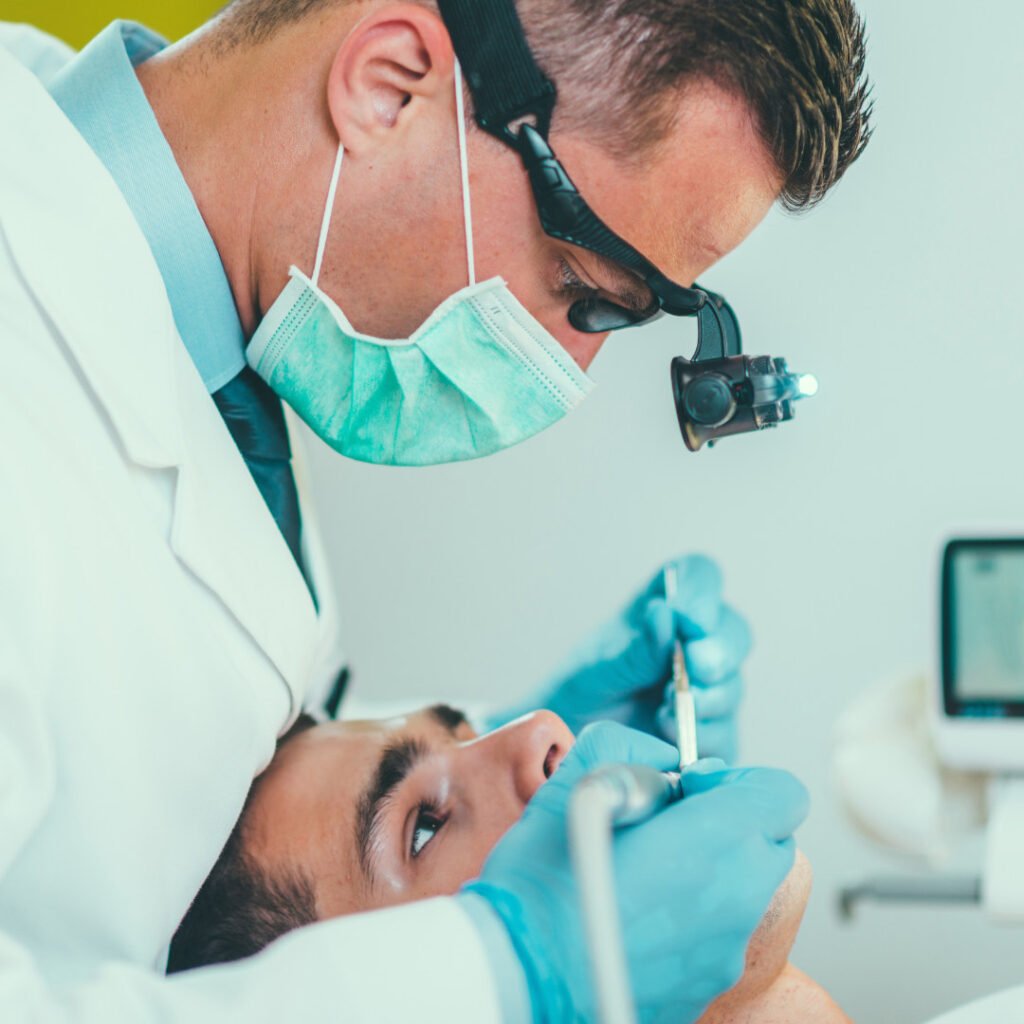
Root canal treatment
Root canal treatment eliminates discomfort and protects your natural teeth for years to come. Schedule an appointment in London online today.



from £65

1–3 days

Root canal treatment
How we can help you?
We at KClinics know how important it is to keep your natural teeth in order to preserve your oral health. So our specialists in endodontic therapies can help you avoid teeth extracted by successfully treating dental infections or damages. We guarantee you reliable and painless root canal therapy without discomfort and maintain your natural smile. We are waiting for you at our London clinic.

What Is Endodontics?
The area of dentistry known as endodontics is dedicated to identifying and treating concerns related to the tissues of the dental pulp and roots. Root canal therapy, which includes extracting inflamed or diseased pulp, cleaning and sanitising the root canal, and sealing it to stop additional damage, for all this treatment we can also say “endodontic treatment.”


When do you need to treat the Root Canal?
You might require root canal therapy if you experience any of there problem:
- Persistent tooth pain: Continuous pain, especially when chewing or exerting pressurу.
- Temperature Sensitivity: Persistent sensitivity to either high or low temperatures, even after the trigger has been eliminated.
- Swollen Gums: Recurrent pimples or swelling on the gums next to the tooth that is afflicted.
- Severe cracks or deep decay: damage or decay tooth that reaches the pulp, leaving it vulnerable to infection.
- Damage to the Tooth: Trauma that causes harm to the pulp and nerves of the teeth.
The Cost of Root Canal Treatment
At our clinic, the cost of a consultation is £50, which is taken as a deposit. This deposit can be fully used towards any future treatments you decide to proceed with.
£100

How Is Root Canal Treatment Performed?
Several crucial steps are usually persist in root canal therapy
Examination: To determine the state of the tooth and the degree of pulp injury, a comprehensive check-up is conducted using digital X-rays.
Anaesthesia: To make sure that the process for patients is painless, we use local anaesthetic
Tooth Isolation: Also during the procedure, the tooth is kept dry and isolated from other teeth.
Access Opening: To gain access to the pulp chamber for root canals, the dentist takes a tiny incision in the tooth’s crown.
Pulp Removal: The inflamed or infected pulp inside the tooth is removed using specialised tools.
Cleaning: Using rotary tools and antiseptic chemicals, the canals are completely cleared of germs and pulp residues.
Shaping: The canals are shaped to prepare them for proper filling.
Sealing: After cleaning and preparing the treated area, the canals are filled with a biocompatible material (gutta-percha) that prevents reinfection.
Temporary Filling: A temporary filling is used to save your tooth until a permanent restoration is done.
Crown or Filling: In order to fully restore functions and strength, a tooth that has treated root canal typically needs a permanent restoration, like a crown or filling.

How Is Root Canal Treatment Performed?





Identification and Preparation
Examination: To determine the state of the tooth and the degree of pulp injury, a comprehensive check-up is conducted using digital X-rays.
Anaesthesia: To make sure that the process for patients is painless, we use local anaesthetic
Tooth Isolation: Also during the procedure, the tooth is kept dry and isolated from other teeth.
Taking Out the Infected Pulp
Access Opening: To gain access to the pulp chamber for root canals, the dentist takes a tiny incision in the tooth’s crown.
Pulp Removal: The inflamed or infected pulp inside the tooth is removed using specialised tools.
Canal Cleaning and Shaping
Cleaning: Using rotary tools and antiseptic chemicals, the canals are completely cleared of germs and pulp residues.
Shaping: The canals are shaped to prepare them for proper filling.
Canal
Filling
Sealing: After cleaning and preparing the treated area, the canals are filled with a biocompatible material (gutta-percha) that prevents reinfection.
Temporary Filling: A temporary filling is used to save your tooth until a permanent restoration is done.
Long-Term Repair
Crown or Filling: In order to fully restore functions and strength, a tooth that has treated root canal typically needs a permanent restoration, like a crown or filling.

Identification and Preparation
Examination: To determine the state of the tooth and the degree of pulp injury, a comprehensive check-up is conducted using digital X-rays.
Anaesthesia: To make sure that the process for patients is painless, we use local anaesthetic
Tooth Isolation: Also during the procedure, the tooth is kept dry and isolated from other teeth.

Taking Out the Infected Pulp
Access Opening: To gain access to the pulp chamber for root canals, the dentist takes a tiny incision in the tooth’s crown.
Pulp Removal: The inflamed or infected pulp inside the tooth is removed using specialised tools.

Canal Cleaning and Shaping
Cleaning: Using rotary tools and antiseptic chemicals, the canals are completely cleared of germs and pulp residues.
Shaping: The canals are shaped to prepare them for proper filling.

Canal Filling
Sealing: After cleaning and preparing the treated area, the canals are filled with a biocompatible material (gutta-percha) that prevents reinfection.
Temporary Filling: A temporary filling is used to save your tooth until a permanent restoration is done.

Long-Term Repair
Crown or Filling: In order to fully restore functions and strength, a tooth that has treated root canal typically needs a permanent restoration, like a crown or filling.

Benefits of Choosing KClinics for Your Endodontic Care
Comfort-Focused Procedures: To ensure a painless experience, we use anaesthetic and work delicately during procedures.
Our instruments, which range from rotary instruments to X-ray, are made to provide accurate and effective oral care.
Every patient is given a customised treatment plan with an emphasis on their dental health and comfort.
Our endodontists are dedicated to maintaining your natural teeth and enhancing your oral health.
Our staff will provide you thorough aftercare advice after your root canal procedure to ensure a speedy recovery. What to expect and how to take care of your tooth after therapy
After the procedure, your mouth can feel numb for a few hours. To avoid unintentional biting, avoid eating until the feeling returns.
Over-the-counter painkillers such as ibuprofen or acetaminophen are typically effective in mild soreness or tenderness, which patients have for a few days. Observe your dentist’s advice when taking medicine.

Care Tips for a Smooth Recovery
Oral Hygiene: To maintain the region clean without causing any damage to the treated tooth, keep up your good oral hygiene routine, which includes gentle brushing and flossing.
Eating and Drinking: To reduce strain on the treated tooth, limit your intake to soft foods for the first days. Avoid eating crunchy or hard foods that can be aggravating for the treatment region.
Monitoring and Follow-Up: Swelling and Sensitivity: It’s common to have some edema or mild sensitivity upon biting. But, get in touch with our office immediately if you feel excruciating pain, swelling that becomes worse or infection symptoms like fever or pus.
Follow-Up Appointment: It is essential that you show up for any follow-up visits that your dentist has set up. During these appointments,we may be placed for a permanent repair like a crown and make sure the treated tooth heals properly.
Long-Term Care: Permanent Restoration: The majority of teeth that have had root canal therapy will need a crown or filling, this helps fully regain their strength and function. To save your teeth, make sure to plan and make new appointments for this.
Frequent Dental Visits: Keeping an eye on the state of your treated tooth over time and preserving your oral cavity depend on routine dental check-ups.



Personalised Approach
We develop treatment plans that are tailored to each patient’s needs.
Comfort and Safety
To reduce discomfort during the treatment, we employ innovative sedation and anaesthetic techniques, depending on the complexity of the treatment.
Advanced Technology
To get the best outcomes, our clinic uses the newest technologies, such as digital modelling and 3D scanning.
High Hygiene Standards
We adhere to strict sterilisation and safety protocols to protect our patients’ health.
Frequently Asked Questions
A root canal is a dental procedure used to treat an infection or inflammation inside the root of a tooth. To stop additional infection, the process entails cleaning, sealing, and removing any dead or infected pulp from the root canals.
The process is usually painless because of contemporary anaesthetic techniques. Compared to the agony of a tooth infection, you can experience some discomfort both during and after the procedure.
Depending on the case complexity, a root canal treatment can take from 60 to 90 minutes and is usually completed in one or more visits.
A crown is typically advised after root canal therapy to restore the tooth’s function and stop it from decaying .
Root canal therapy may not be necessary if cavities are found and treated early. Preventing serious harm requires maintaining good oral hygiene and scheduling every 6 month dental check-ups.
A tooth that has received root canal therapy can endure for many years, and in certain situations, forever, with the right maintenance.
If the tooth has significant damage and the pulp is infected, the only alternative may be tooth extraction. Root canal treatment is the only way to save the tooth.
No, other teeth are unaffected by root canal therapy. Only the afflicted tooth is the target of this therapy.
Yes, even after treating a root canal, a tooth may still be vulnerable to cavities if it is not taken care of properly. This emphasises how crucial it is to apply a crown for future protection.
After treating a root canal, the tooth may occasionally have a small colour change. For a more aesthetic appearance, we advise taking crown placement or teeth whitening.

Emma R.
James T.
Charlotte W.
Sarah M.

Book a personal consultation
We work in a personalised way with Your Needs
Let’s discuss your goals and create a personalised plan for your dental or aesthetic care. Our specialists are here to guide you every step of the way.




